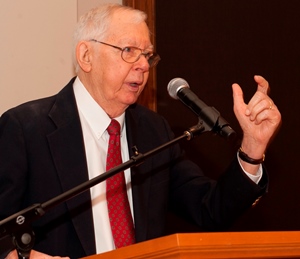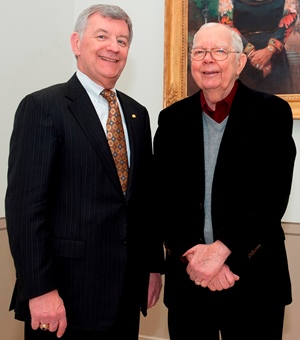William K. McElvaney Dies at 86
Memorial service honoring the life of Rev. William K. McElvaney set for 2:00 P.M., Monday, September 8, at Northaven United Methodist Church.
The Reverend Dr. William K. McElvaney, Le Van Professor Emeritus of Preaching and Worship at Perkins School of Theology, Southern Methodist University, died early Sunday, August 24, at his home in Dallas, at the age of 86. A memorial service is planned for 2:00 p.m., Monday, September 8, at Northaven United Methodist Church, 11211 Preston Road, Dallas.
Rev. McElvaney announced in an August 4 message to Northaven United Methodist Church that he and his wife Fran had recently made the decision to focus on “palliative care through hospice” rather than continuing further medical treatments for advanced liver cancer.
Award recipient, speaking at award banquet (February 4, 2013)  |
| Rev. William K. McElvaney, 2013 Perkins Distinguished Alumnus Award Award recipient, speaking at award banquet (February 4, 2013) |
Rev. Eric Folkerth, pastor of Northaven UMC where Rev. McElvaney was pastor emeritus, offered words of appreciation for Rev. McElvaney’s long and productive ministry. “Bill McElvaney was a tireless prophet and preacher for more than 50 years, and time and time again took bold stands to lift up those who were often most marginalized in our society,” Rev. Folkerth said.
Rev. McElvaney earned the M.Div. (M.Th.) from Perkins in 1957, after earning an M.B.A. (1951) and B.B.A. (1950) from SMU. Upon graduation from Perkins, McElvaney served for 15 years as pastor of several United Methodist congregations. He then served for 12 years as president of the United Methodist-related Saint Paul School of Theology in Kansas City, Missouri, where the William K. McElvaney Chair in Preaching was established in his honor in 1988. He received the SMU Distinguished Alumnus Award in 1980, and the William K. McElvaney Fund for the Advancement of Peace and Justice was established at SMU in 1993. He received the Perkins School of Theology Distinguished Alumnus Award in 2013.
In addition to his three earned degrees from SMU, McElvaney was honored with Doctor of Divinity degrees from Southwestern University in Georgetown, Texas (1972), and Central Methodist College in Fayette, Missouri (1978). Other honors include: Peacemaker of the Year Award, presented by the Dallas Peace Center to McElvaney and his wife Fran, for their lifelong dedication to peace, civil rights, and social justice (1997); Fitzpatrick Award for Ecumenical Leadership, presented by the Texas Conference of Churches (1999); and the Heroes of Hope Award (2001), presented by the Cathedral of Hope in Dallas, for lifetime leadership in social justice issues and recognition of courage that provides hope for all people.
McElvaney was author of numerous books, including: Christ's Suburban Body (co-authored with Wilfred M. Bailey, 1970); The Saving Possibility (1971); Cerebrations on Coming Alive (1973); Good News Is Bad News Is Good News (1980; third printing 1987; first edition in Chinese, 1988); The People of God in Ministry (1981); Preaching from Camelot to Covenant (1989); Winds of Grace, Ways of Faith (1991); Eating and Drinking at the Welcome Table (1999); and Becoming a Justice Seeking Congregation (2009). He also has published a number of articles in professional journals and papers.
After being ordained an elder in the North Texas Conference UMC in 1957, McElvaney served as pastor of First Methodist Church, Elma, Washington (1957); First Methodist Church, Justin, Texas (1958–59); originating pastor of St. Stephen Methodist Church, Mesquite, Texas (1959–67); and Northaven United Methodist Church, Dallas (1967–73). He subsequently served as president of Saint Paul School of Theology (1973–85), and Le Van Professor of Preaching at Worship at Perkins (1985–93). Following his retirement from Perkins, McElvaney continued his service to SMU and the larger community as part-time assistant chaplain, SMU (1993–97); Coordinator of the Dallas Area Ecumenical Jubilee Project (1997–2000); and interim minister of Midway Hills Christian Church (Disciples of Christ) in Dallas (2001–2002).
Along with additional service to SMU as a Board member of the Maguire Center for Ethics and Public Responsibility, McElvaney served on the boards of the Greater Dallas Community of Churches; Pastoral Counseling and Education Center of Dallas; Salud y Paz Guatemala; Dallas Peace Center; Dallas Wilkinson Center Advisory Board; and as a member of the Church in Society Committee, Human Development Fund Committee, and Faith Voices on Justice Committee at Northaven UMC.
Rev. McElvaney married Frances Owens McElvaney in 1960. They have two children, Shannon and John; three grandchildren; and four great-grandchildren.
Rev. McElvaney donated his body to The University of Texas Southwestern Medical School. Memorial gifts may be directed to the Northaven UMC Human Development Fund, North Dallas Shared Ministries, or to SMU/Perkins School of Theology.
• Full text of Dean Lawrence’s statement about Rev. McElvaney’s life and ministry [PDF]
• Full text of Rev. McElvaney’s statement announcing intention to enter into hospice care
• “William McElvaney, social justice advocate, dies at 86,” United Methodist News Service article by Sam Hodges
• Video of Perkins School of Theology 2013 Distinguished Alumnus Award banquet, including testimonial by Northaven UMC pastor Rev. Eric Folkerth and acceptance speech by Rev. McElvaney (February 4, 2014)
• SMU video of Rev. McElvaney interviewed by Provost Emeritus Neill McFarland (November 3, 2000)
• “Bill McElvaney, Methodist minister who pushed for social justice, dies at 86,” Dallas Morning News article by David Flick (August 24, 2014)
Full text of statement by Dean William B. Lawrence on the life and ministry of Rev. Dr. William K. McElvaney [view PDF]:
Early in the morning, on the first day of the week, when it was just beginning no longer to be dark in Dallas, Bill McElvaney left his colleagues and friends and moved into the community of the saints. We will miss him. And we will all be diminished by his absence from us, now that he has died.
An ordained United Methodist minister in the North Texas Annual Conference, an emeritus professor from the faculty of Perkins School of Theology at Southern Methodist University, and a former President of Saint Paul School of Theology, Bill was actually an exceptional person in the sense that he was simply true to the doctrines and disciplines of his church. While plenty of preachers lament the lack of justice in the world, Bill devoted himself to working for justice. While plenty of professors teach about the love of Christ as a matter of personal devotion and public witness, Bill committed himself to living that word as an essential aspect of believing that word—not just engaging in intellectual chats about it.
Bill received a share of recognitions for his efforts. He was celebrated as one of the Distinguished Alumni Award recipients of Southern Methodist University. And he was also celebrated separately as one of the Distinguished Alumni Award recipients at Perkins School of Theology.
Bill also received a share of criticism for his efforts. He received criticism when he actively opposed the efforts of Southern Methodist University to become the home of a Presidential Library when he believed that the President whom it would honor had been the author of policies that dishonored the doctrines of the church, the disciplines of faith, and the principles of American democracy.
But, while he was grateful for any accolades that came his way and while he was respectful of the rejections that came his way, neither of those things had any impact on his ego or his courage. He would express gratitude for praise and note that others were far more worthy to receive it. He would express respect for his critics and note that they were entitled to their views, though he hoped they would also respect his concerns for victims of suffering and injustice.
Bill was the best kind of fundamentalist—not the kind that read the Bible literally but the kind who take the Bible seriously. He actually believed that followers of Jesus were to be held accountable for the Christ’s message about feeding the hungry. He really believed that the Beatitudes in Jesus’ Sermon on the Mount were serious promises made to the peacemakers and to those who hunger and thirst for righteousness.
 |
| Perkins School of Theology Dean William B. Lawrence (l) with Rev. William K. McElvaney, at the Perkins Distinguished Alumnus Award banquet (February 4, 2013) |
Bill was a man of integrity in the classic meaning of that term. He was a whole person. He believed deeply and understood fully that a Christian had to develop a wholly integrated system of beliefs and practices. When he disagreed with someone strongly, as he did with me about whether the Bush Library should come to SMU, he expressed his views vigorously. But when the matter was resolved, when the processes of the church and the university had reached a conclusion that the Bush Library would come to the campus, Bill harbored no grudges. He never engaged in recriminations. He would never withhold his affection from a colleague or neighbor, even one with whom he disagreed intensely. He helped lead a demonstration on the day the Library was dedicated. But the next day he greeted me with a smile, an embrace, and a word of encouragement.
He also never let his own ego get in the way. In the midst of the big debate over the Bush Library, Stephen Colbert took notice of the allegedly aging hippie who opposed having the Presidential Center on campus. Colbert put a remarkably unflattering photo of Bill McElvaney on the screen and made unpleasantly sarcastic remarks about him. Bill’s sense of justice was profound, but he did not lack a sense of humor. Some of us with thin skins might have demanded a correction, if not an apology, from the television celebrity. Bill understood the beauty of great fun and enjoyed it with the rest of us.
One did not have to agree with Bill McElvaney to be his friend or to experience his grace. Someone could oppose him in a debate on Saturday and feel his embrace in the church service on Sunday. And, to this day, students at Perkins School of Theology are receiving scholarship assistance for their studies and are being awarded special prizes for sermons on social justice because he believed it was important to be generous to others.
Bill McElvaney was a man of faith, a man of courage, a man of principle, and a man of integrity. He followed Jesus in his boundless love for people. When church rules imposed limits or boundaries on the extent of love, he preferred to transgress the laws of the church than to violate the word of the Lord. He was a martyr in the classic sense of that term—a witness, who was quite prepared to endure the consequences for his action, but who would never recoil from acting in the way that faith demands.
His friends and his adversaries alike could both learn from him that it is a Biblical mandate to love our enemies. His friends and adversaries alike should ponder what we all might do, not only to pray for the suffering people of the world but also to create systems of justice for the suffering of the world. That is what Bill gave his life to pursuing. In his death, we could all benefit from honoring and replicating his faithful integrity.
William B. Lawrence
August 24, 2014
Perkins School of Theology, founded in 1911, is one of five official University-related schools of theology of The United Methodist Church. Degree programs include the Master of Divinity, Master of Sacred Music, Master of Theological Studies, Master of Arts in Ministry, Church Ministries, and Doctor of Ministry, as well as the Ph.D., in cooperation with The Graduate Program in Religious Studies at SMU’s Dedman College of Humanities and Sciences.